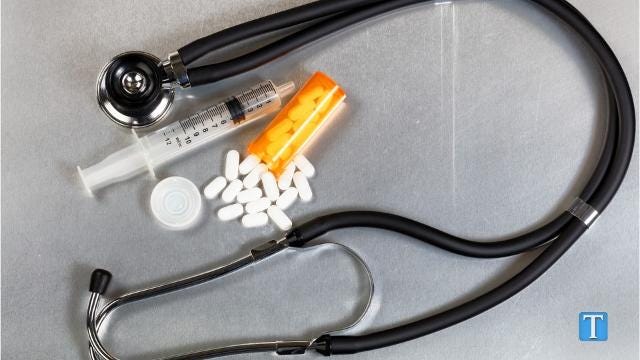Cause and Effect
 |
Dr.
Thomas Pollard, a cardiothoracic surgeon in Knoxville, Tenn., and his
team working to replace heart valves that had been damaged from
endocarditis, an infection the patient developed from injecting drugs. CreditShawn Poynter for The New York Times
|
Cause and Effect
"We've literally had some continue using drugs while in the hospital. That's like trying to do a liver transplant on someone who's drinking a fifth of vodka on the stretcher."
Dr. Thomas Pollard, cardiothoracic surgeon, Knoxville, Tennessee
"It's just a lot of anecdote -- surgeons talking to each other, trying to determine when we should and when we shouldn't [conduct open-heart surgery on hearts damaged from infections patients develop from injecting drugs]."
"Everybody has sympathy for babies and children. No one wants to help the adult drug addict because the thought is they did this to themselves."
Dr. Carlo Martinez, cardiac surgeon, Methodist Medical Center, Oak Ridge, Tennessee
"He said once someone's been shooting up, you go through all this money and surgery and they go right back to shooting up again, so it's not worth it [life-saving heart surgery]."
"I was just dumbfounded."
Brian Mignogna, stepfather, Jerika Whitefield, Olive Springs, Tennessee
"I know next time God might not save me. They will not treat me for a second time if I have track marks or anything like that."
"Nobody will see me because of my drug use history."
"I'm trying to think of ways to get myself more hope here."
Jerika Whitefield, 28, mother of three
 |
| A spike in the number of patients coming in with infected heart valves has surgeons speaking up -- because even if the expensive and involved surgery is successful, most of these patients will still die young. Wochit |
A serious new health hazard has surfaced linked to methamphetamine use and the opioid crisis, both of which pose as dire threats to people's health and longevity in a culture where drug use has become distressingly commonplace. Both because doctors and dentists as well have been over-prescribing the use of painkillers, and because the looser availability of street drugs has captured the minds and perceived emotional needs of people as never before.
With the proliferation of drug use, users are increasingly becoming ill with endocarditis as a result of injecting drugs, often repeatedly going through these bouts of ill health resulting from continuing to shoot up even after first-time recovery of endocarditis. Jerika Whitefield was one of the countless people developing endocarditis, an infection of the heart valves. Bacteria entering her blood after methamphetamine injections caused the endocarditis, a now-commonplace-occurrence among drug users.
Before undergoing surgery, the very ill woman was informed by the attending cardiologists that should she continue shooting up, and should she become reinfected, the surgeons would not again operate to save her life. While drug users' habits are responsible for damaging their hearts, surgery is able to salvage the damaged organ, but if the addiction is unaddressed the result will simply be repeats of the situation.
Dr. Pollard had an experience that unnerved him when he replaced a 25-year-old man's heart valve, the result of injecting drugs. Several months on, the man returned with the very same injury to his heart repeated due to continued drug injection. Because Dr. Pollard would not repeat the surgery on the basis that this self-harm was needlessly repeated, the man died not long afterward at a hospice. "It was one of the hardest things I've ever had to do."
Doctors in the United States are increasingly encountering patients developing endocarditis from injecting drugs. At two Boston hospitals, a recent study revealed, seven percent of endocarditis patients, intravenous drug users, survived for ten years without reinfection or other complications, while 41 percent of patients who were not IV drug users survived. Dr. Pollard now lobbies hospital systems for the provision of addiction treatment for those endocarditis patients willing to be involved.

Rural east Tennessee is particularly afflicted by addictions. Poverty-stricken small towns and poor health conspire to leave people with little hope for their futures. Opioid prescriptions remain high, with death rates from overdose three times that of the national average. Most doctors operate on patients with a first-time endocarditis presentation resulting from drug injections, but repeat infections mean the damage can be more extensive and more difficult to remediate.
Ms. Whitefield suffered from endometriosis as a teen, a disorder of the uterine tissue, as well as interstitial cystitis, a painful bladder condition, leading her to prescription opioid use for years. After her third child was born, she suffered postpartum depression and began injecting crushed opioid pills and meth. She shared a needle with one of her brothers in 2016 which resulted in initiating organ shut-down and was rushed to hospital.
"She was a young mother and her family was involved; her father was there [at the hospital]", explained Dr. Martinez, the on-call heart surgeon. "To me, it seemed she had that social support that patients need once they recover from this." The initial infection was cleared with the use of antibiotics. Two months later she required surgery, her mitral valve so damaged signs of heart failure were evinced.
Before Dr. Martinez operated, he warned that the surgery would be "a one-time deal", recalled her stepfather. Since her surgery, she has felt weak, suffered occasional chest pains, had problems sleeping, felt cold continually. She also had hepatitis C, common among people who inject drugs. Her cardiologist, Dr. Larry Justice, informed her that "One of your other valves is leaking a a fair amount. I can't guarantee you won't need another valve surgery", he informed her.
"I just want to live to see my kids grow up", she responded.
 |
0 Comments:
Post a Comment
<< Home